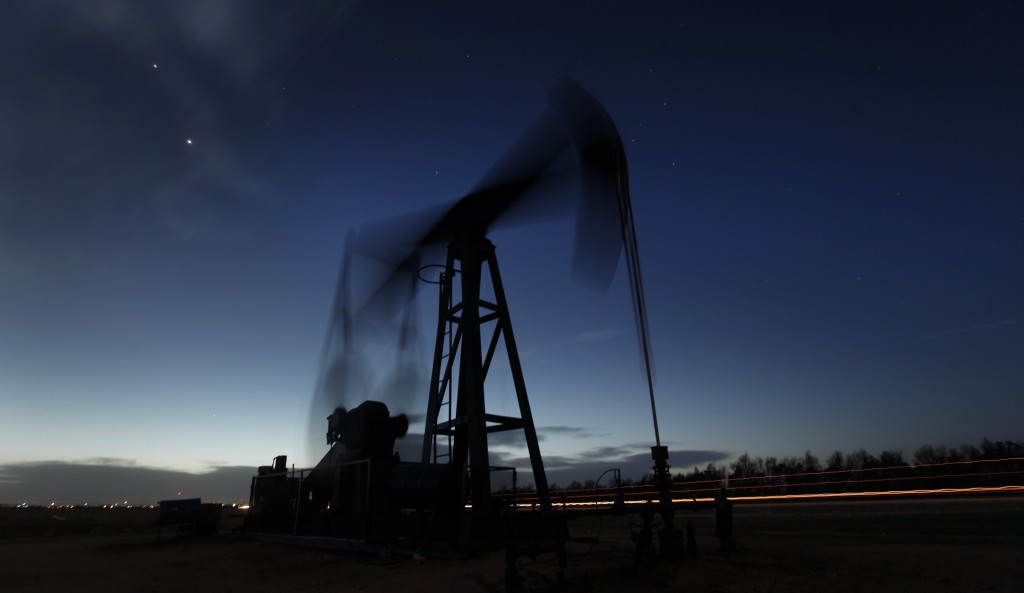Russia backs OPEC oil output hike

In this file photo taken with a long exposure, a pumping unit sucks oil from the ground near Greensburg, Kan. AP FILE PHOTO
VIENNA, Austria – Russia on Saturday joined an OPEC-led pledge to boost oil production in response to growing global demand, capping a week of tense diplomacy for the grouping that averted a damaging rift between arch foes Iran and Saudi Arabia.
Speaking after a meeting in Vienna, Russian Energy Minister Alexander Novak said the agreement would give the OPEC and non-OPEC countries cooperating in a landmark supply-cut pact the necessary “flexibility” to prevent the market overheating.
The non-cartel countries in the so-called OPEC+ alliance were widely expected to give their backing after ministers from the Organization of Petroleum Exporting Countries already agreed on Friday to boost output from July.
“We came to the conclusion that what was needed was about a million barrels of additional production,” Saudi Arabia’s Energy Minister Khalid al-Falih told a press conference.
The proposal is the result of a compromise hammered out in days of fractious talks in Vienna dominated by Iran’s resistance to easing an 18-month-old supply-cut deal credited with lifting oil prices to multi-year highs.
Article continues after this advertisementSaudi Arabia, supported by Russia, was strongly in favor of pumping more oil to allay fears of a supply crunch and ease concerns about the high prices in major consumer countries like the United States, China and India.
Article continues after this advertisementBut Iran, bracing for the impact of fresh US sanctions on its oil exports, fiercely objected to raising output targets, as did countries like crisis-hit Venezuela and Iraq who are unable to raise output in the near term.
But in the end, a vaguely-worded statement that made no mention of the one-million figure allowed all sides to save face.
Ministers also acknowledged that production problems in some countries meant the real number of extra barrels coming to the market would be several hundred thousand less.
Markets were disappointed with the modest output hike, sending crude prices soaring on Friday.
Brent crude added $2.50 to finish at $75.55 a barrel, while the US benchmark West Texas Intermediate gained $3.04 at $68.58 per barrel.
Vague statement
The supply-cut pact clinched in late 2016 between 24 OPEC and non-cartel members, which is set to run until the end of the year, called on participants to trim output by 1.8 million barrels a day.
But production constraints and geopolitical factors have seen several nations exceed their restriction quotas, keeping some 2.8 million barrels off the market, according to OPEC.
By now agreeing to collectively raise output by a million barrels, countries are simply committing to comply fully with the original pact — allowing the bloc to increase supply without unwinding the deal.
But the joint communiqué did not spell out how the new barrels would be divvied up, a key issue given Iran’s insistence that cartel members should not to be allowed to offset other members’ involuntary production losses.
Grilled by reporters, Saudi’s Falih said a technical committee would work out the details but that the aim was not to be “overly strict” about exact allocations per country.
“We as Saudi Arabia obviously can deliver as much as the market would need but we are going to be respectful of the one-million barrel cap,” he said.
Russia, Saudi Arabia and its Gulf allies Kuwait and the United Arab Emirates are among the few countries that can realistically ramp up production immediately.
Iran is bracing for production shortfalls because of renewed sanctions following US President’s Donald Trump’s decision to quit the international nuclear deal.
In Venezuela, an economic and political crisis has savaged petroleum production while fighting between rival factions has damaged key oil infrastructure in Libya.
Trump weighs in
Geopolitical tensions loomed large over this week’s meetings in the Austrian capital, and US President Donald Trump was the elephant in the room.
Trump has repeatedly lashed out at OPEC on Twitter in recent months, piling pressure on key ally Riyadh to boost output as he hopes for lower pump prices before US voters go to the polls for mid-term elections in November.
The US leader weighed in again on Friday, tweeting: “Hope OPEC will increase output substantially. Need to keep prices down!”
Iran’s Zanganeh accused Trump of trying to politicize OPEC and said it was US sanctions on Iran and Venezuela that had helped push up oil prices.
Asked whether Trump had influenced discussions, Novak replied: “Twitter is not one of the instruments that we base our decisions on.”
Novak also brought Russia’s football fever to Vienna, presenting a stuffed animal version of the World Cup’s wolf mascot to OPEC secretary general Mohammad Barkindo from Nigeria, whose country last night beat Iceland 2-0. /cbb